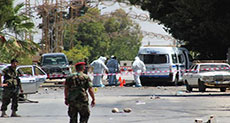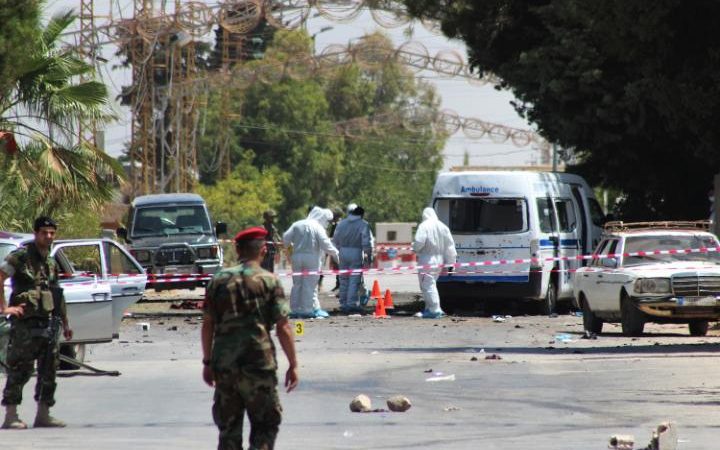
Al-Qaa is a Sign of Things to Come

Darko Lazar
In a country where the norm is a constant state of crisis, the most recent period of relative calm is now over.

Lebanon's predominantly Christian village of Qaa has joined the country's long list of terrorist targets.
Four suicide bombers blew themselves up in the northeastern Lebanese village early on Monday, killing five people and wounding another 15.
In the evening, as family members gathered outside a church to mourn the morning's victims, two men on a motorcycle threw a grenade at the group before detonating suicide vests, wounding another 13 people.
And while Lebanon is no stranger to suicide bombings - having been repeatedly struck by militant groups operating inside Syria - this attack was different.
"We are definitely facing a new phase in the terrorists' modus operandi," stated Lebanon's army chief Jean Qahwaji.
Warning of a heightened terrorist threat, the Lebanese government said the attack and the unfamiliar way in which it was carried out represented a new phase of "confrontation between the Lebanese state and evil terrorism."
In reference to the number of assailants, Lebanon's information minister, Ramzi Jreij, said that the country's prime minister, Tammam Salam, "expressed his fear that what happened in Qaa is the start of a new wave of terrorist operations in different areas of Lebanon."
According to the director of the Media Focal Center (Irtikaz), Salem Zahran, regional terrorist groups are gearing up for another deadly campaign against Lebanon.
"The Takfiri groups are preparing crazy scenarios. This revelation did not come through predictions but rather through data obtained by the Lebanese army and intelligence services from two [terrorist] cells dismantled in the town of Khirbet Daoud in Akkar. Members of these cells admitted that they were preparing scenarios similar to those that happened [in Qaa], but they had specified different geographical locations. They specified tourist resorts in east Beirut and targets in the southern suburbs of Beirut. The security services were expecting the type of attack we saw in Qaa. But they were expecting it at a different time and place," Zahran says.
Qaa sits on a strategic route, linking Lebanon's Bekaa Valley to the Syrian town of Qusair.
"[The suicide bombers] are coming from Syria and this is the route that they take heading into the rest of the country," says Beirut-based political analyst, Kamel Wazne.
Aside from the newly-conceived terrorist campaign, Lebanon has also become the target of economic and diplomatic measures adopted by some of Beirut's more ‘traditional allies' in the Persian Gulf - namely Saudi Arabia.
Buckling under the weight of a prolonged political paralysis, the Lebanese state is also under pressure from Washington and co. to become more hostile towards Hezbollah, or face serious consequences.
And as the country gets swallowed up by the regional chaos and superpower rivalries, the predictions are grim indeed.
"The explosions that took place [in Qaa] were meant to displace our people from Qaa, perhaps to lay the groundwork for the occupation of Qaa. The ‘Caliphate' scenario is always present. These Takfiri groups suffered a big blow in Iraq, and are facing another big blow in Syria. The question is whether Lebanon is meant to serve as a substitute [for those countries]," Zahran opines.
Theories that terrorist groups and their backers are looking to break the ‘security fences' around war-torn Syria to serve as valves for releasing pressure on the withdrawing militants, are becoming increasingly plausible.
The Qaa attacks come less than a week after a car bombing at a Jordanian refugee camp near the Syrian border that killed seven Jordanian border guards.
The border incident, which followed a June 6 attack on a security office near the Jordanian capital of Amman, marked the first attack of its kind.
Meanwhile the monarchy in Amman, which has always served as a loyal asset to western and Saudi interests - much like some of the ruling political parties in Beirut - has a PR disaster on its hands.
An ‘investigation' by western propaganda tools, The New York Times and Qatar's Al-Jazeera, revealed that CIA weapons destined for ‘moderate Syrian rebels' wound up on the black market, courtesy of corrupt Jordanian intelligence officers. It is the very same officers that so generously assisted militant groups, as long as they remained in Syria.
But as regional terrorist groups and their real puppet masters look for alternative bases of operation, friends and foes alike in Lebanon, Jordan and even Turkey are fast becoming fair game.
Monday's bombings in the Lebanese village, which come almost two years to the day since militants invaded another border town of Arsal in August 2014, serves as a sobering realization of the immense challenges facing Lebanon's army and the country's resistance group Hizbullah - largely credited with preserving the Lebanon-Syria border and keeping Lebanon out of the Syrian quagmire.
Source: al-Ahed news



